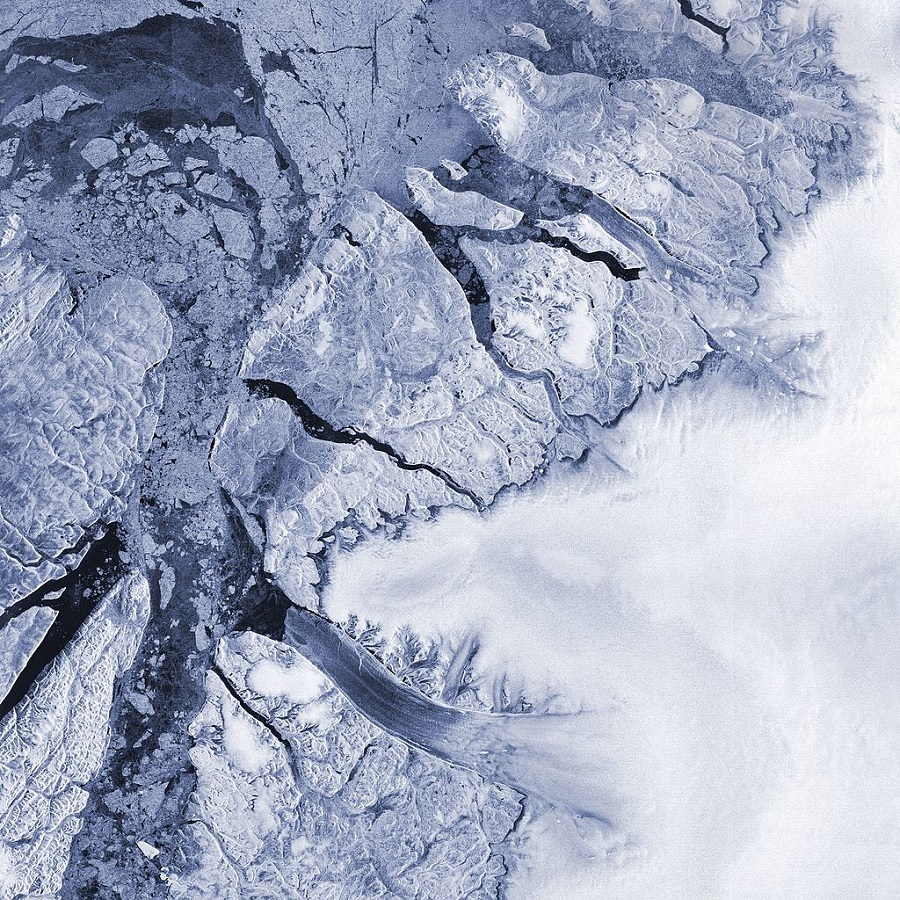The world recently suffered another blow in the hopes of averting the effects of climate change. Canada’s last fully intact ice shelf has lost around 43% of its area in less than a week, researchers find.
Climate change: ‘Above normal’ temperatures lead to 40% disintegration of Canadian ice shelf
Milne Ice Shelf, located at the northwest coast of Ellesmere Island in Nunavut lost around 43% of its total area producing an island of ice drifting into the Arctic Ocean. The collapse was observed by the Canadian Ice Service between July 30 to Aug. 4 with an animation that can be watched below.
Satellite animation, from July 30 to August 4, shows the collapse of the last fully intact #iceshelf in #Canada. The Milne Ice Shelf, located on #EllesmereIsland in #Nunavut, has now reduced in area by ~43%. #MilneIceIsland #seaice #Arctic #earthrightnow #glacier pic.twitter.com/jjs1gawoxA
— ECCC Canadian Ice Service (@ECCC_CIS) August 4, 2020
Researchers found the Milne Ice Shelf collapsing on Aug. 2 producing an ice island of around about 79 km2 (around 30.5 mi2). To have an idea of how big that was, note that Manhattan’s land area is only 59.1 km2 (22.82 mi2). The scientist explained that the massive collapse happened after they observed above normal air temperatures leading to the breaking of the ice shelf along with offshore winds and the water in front of the ice shelf.
Before anyone dismisses the phenomenon as just an effect of the summer season, Luke Copland, University Research Chair in Glaciology of University of Ottawa’s Department of Geography, pointed out that the Milne Ice Shelf collapse is “clearly” connected to climate change.
Copland further explained that this year’s summer has been hotter by 5°C compared to the recorded average temperature from 1981 to 2010. “The region has been warming at two to three times the global rate,” Copland added.
Milne Ice Shelf collapse would have endangered researchers
Due to the size of the collapse, the researchers’ camp area and equipment were reportedly damaged. Luckily, the scientists were remotely observing the ice shelf through satellite images when it took place.
If the status of climate change would not change soon, experts believe that the Canadian ice shelves “will disappear” in just decades. It is worth noting that Milne was the second largest section of the original Ellesmere Ice Shelf. The latter was once known as the largest in all of Arctic with the earliest documentation dating back to 1875.



 Thousands of satellites are due to burn up in the atmosphere every year – damaging the ozone layer and changing the climate
Thousands of satellites are due to burn up in the atmosphere every year – damaging the ozone layer and changing the climate  Extreme heat, flooding, wildfires – Colorado’s formerly incarcerated people on the hazards they faced behind bars
Extreme heat, flooding, wildfires – Colorado’s formerly incarcerated people on the hazards they faced behind bars  LA fires: Long-term exposure to wildfire smoke is poorly understood − and a growing risk
LA fires: Long-term exposure to wildfire smoke is poorly understood − and a growing risk  Rise of the Zombie Bugs takes readers on a jaw-dropping tour of the parasite world
Rise of the Zombie Bugs takes readers on a jaw-dropping tour of the parasite world  Swimming in the sweet spot: how marine animals save energy on long journeys
Swimming in the sweet spot: how marine animals save energy on long journeys  What’s so special about Ukraine’s minerals? A geologist explains
What’s so special about Ukraine’s minerals? A geologist explains  As the Black Summer megafires neared, people rallied to save wildlife and domestic animals. But it came at a real cost
As the Black Summer megafires neared, people rallied to save wildlife and domestic animals. But it came at a real cost  How ongoing deforestation is rooted in colonialism and its management practices
How ongoing deforestation is rooted in colonialism and its management practices  GesiaPlatform Launches Carbon-Neutral Lifestyle App ‘Net Zero Heroes’
GesiaPlatform Launches Carbon-Neutral Lifestyle App ‘Net Zero Heroes’  Burkina Faso and Mali’s fabulous flora: new plant life record released
Burkina Faso and Mali’s fabulous flora: new plant life record released  The UK is surprisingly short of water – but more reservoirs aren’t the answer
The UK is surprisingly short of water – but more reservoirs aren’t the answer  Fertile land for growing vegetables is at risk — but a scientific discovery could turn the tide
Fertile land for growing vegetables is at risk — but a scientific discovery could turn the tide  An unexpected anomaly was found in the Pacific Ocean – and it could be a global time marker
An unexpected anomaly was found in the Pacific Ocean – and it could be a global time marker 































